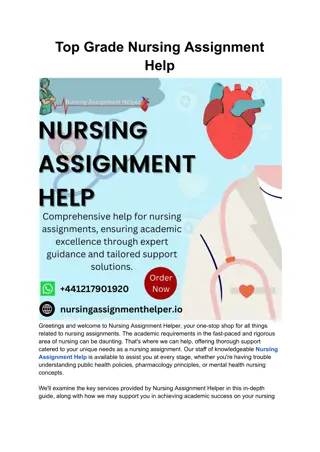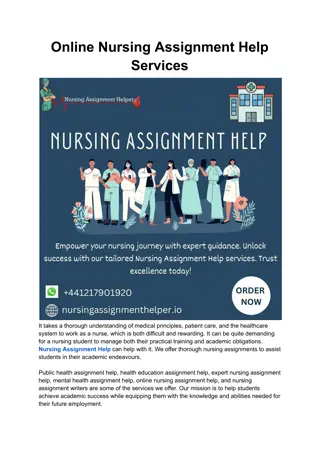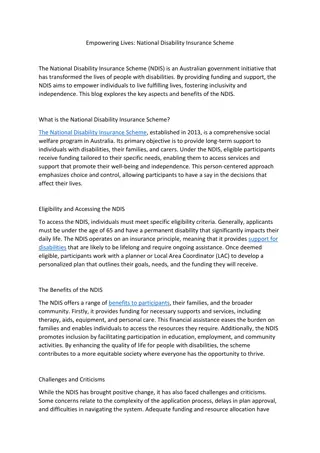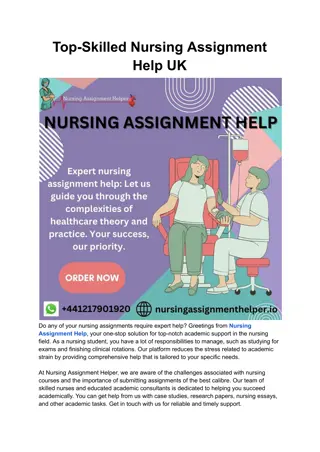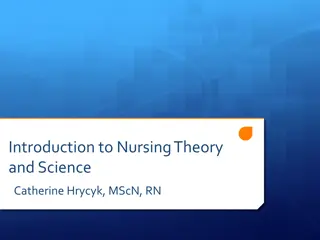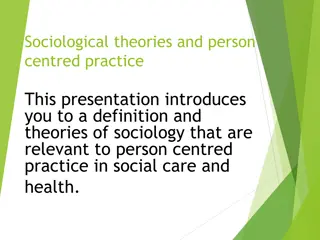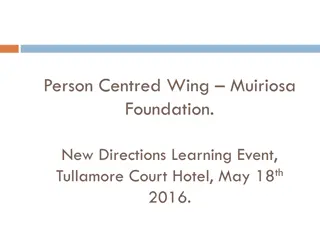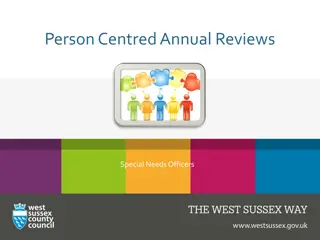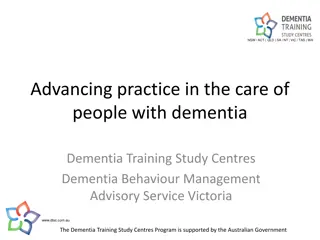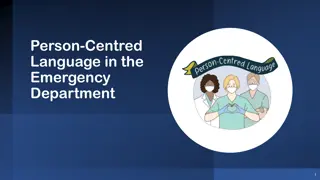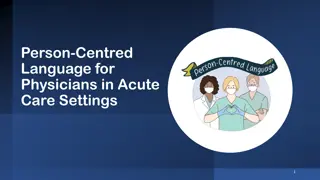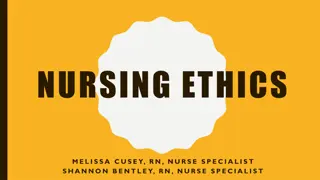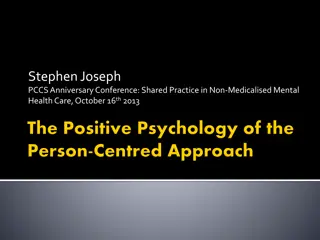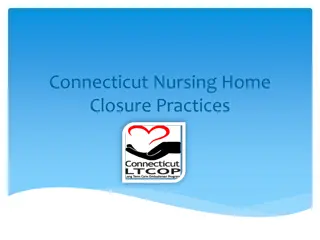Understanding Person-Centred Care Values in Nursing
Explore the significance of nursing values in person-centred care through the perspective of Abertay University's SWAP Lecture. Delve into the essence of value-based, person-centred care and its crucial role in nursing practice. Reflect on the essence of compassion, dignity, and spirituality in providing high-quality care to individuals. Uncover the importance of seeing beyond illnesses and disabilities to truly focus on the individual in need of compassionate care.
Download Presentation

Please find below an Image/Link to download the presentation.
The content on the website is provided AS IS for your information and personal use only. It may not be sold, licensed, or shared on other websites without obtaining consent from the author. Download presentation by click this link. If you encounter any issues during the download, it is possible that the publisher has removed the file from their server.
E N D
Presentation Transcript
Person Centred Care Nursing Values Abertay University 2016 SWAP Lecture 2016 1
Aims for this session: What are nursing values? Understand what is meant by the term person centred care Abertay University 2016 Understand what is meant by delivering person centred care 2
Take a moment to think about what is meant by value-based, person- centred care and why is this important in nursing? Abertay University 2016 3
If we consider the nurses code (NMC, 2015) and the guidance on professional conduct for nursing and midwifery students, the values of the nurses role become clearer. So whilst the NMC code clearly defines nursing values it remains each nurses responsibility to deliver care in a way that reflects these values A patient is not just someone who needs for example, a bath; they have life histories and experiences that have made them unique individuals and we need to consider the person in this context Abertay University 2016/16 MHN006 Ref: Delves-Yates, C., 2015 Essentials of Nursing practice: London. Sage The Nursing code is our compass to high standards of care 4
Abertay University 2016/16 MHN006 5
Activity 1 Reflect on your own values It is important to recognise and respect differences between us while owning our own personal hopes, concerns and values. Abertay University 2016/16 MHN006 please take a few minutes to identify some of your own personal or family values . 6
Person centred Care Compassion Abertay University 2016/16 MHN006 Spirituality caring Value-based Dignity nursing 7 Ref: Delves-Yates, C., 2015 Essentials of Nursing practice: London. Sage
Keeping the person at the centre. Seeing beyond the illness or disability to the person may be a way of helping to keep focussed on the business of providing high quality compassionate care. MHN0068 Abertay University 2016/16 what do you see?
Persons living with dementia are usually capable of more than we can imagine
What do we mean by Abertay University 2016/16 MHN006 Compassion? 10
Compassion Compassion has been a value central to nursing since the profession was established Abertay University 2016 11
Sadly you may have noticed in the media it seems to be the one thing that the profession has been charged with losing, diluting and undervaluing as other priorities take its place. Abertay University 2016/16 MHN006 12
The Francis Report (2013) and a number of other reports consider occasions when patients were not treated with the compassion they deserved, along with a number of other serious failings. Abertay University 2016/16 MHN006 13
Compassion continued. Compassion is directly derived from the ethical principle of beneficence. Abertay University 2016/16 It is the ethical principle which requires that we seek to do or produce good for others. MHN006 14 Ref: Delves-Yates, C., 2015 Essentials of Nursing practice: London. Sage
Although nursing is diverse and multi-faceted, all nursing practice shares the same ultimate aim to improve the lives of those receiving health care So for example a nursing activity such as feeding a patient does not just mean that the direct effect of the task is the patient being fed; Abertay University 2016/16 MHN006 it also depends upon how the food is given! 16
Caring Caring is frequently described as being at the heart of nursing, but what exactly that means appears to differ between nurses. Abertay University 2016/16 MHN006 And also between patient and carer groups 17
Take a moment to reflect: Turn to the person next to you and see if you can identify what we mean by caring behaviours. Abertay University 2016/16 MHN006 For example: Giving reassurance to a friend who is going through difficult times. 18
Dignity Is also enshrined not only within nursing guidance but also other health professionals guidance and legislation (NMC, 2015), Human Rights Act (1998), The general medical council guidance (GMC, 2006) Abertay University 2016/16 MHN006 Yet what do we understand by the term Dignity? 19
Take a moment to reflect on the concept of dignity and see if you can define what it means to you Abertay University 2016/16 MHN006 20
Un-dignified Care https://www.youtube.com/ watch?v=qIgXN_ckDZg Abertay University 2016/16 MHN006 21
Dignity Continued Is dignity clearly understood? Abertay University 2016/16 MHN006 How would you promote dignity? 22
Dignity Little Things Make A Difference https://youtu.be/ueLqAJRxKpQ Abertay University 2016/16 MHN006 23
SPIRITUALITY What does this mean to you? Abertay University 2016/16 MHN006 What does this mean for our patients? 24
General attributes nurses must attain Respect Effective communication Empowerment Abertay University 2016/16 MHN006 Worth Autonomy 25 Privacy Ref: Delves-Yates, C., 2015 Essentials of Nursing practice: London. Sage
Attributes felt by patients to be important Self-respect and self esteem Self-confidence and self-identity Independence Abertay University 2016/16 MHN006 Personal standards are appreciated Able to make choices 26 Control over surroundings and how others treat them Ref: Delves-Yates, C., 2015 Essentials of Nursing practice: London. Sage
Values and mental health Nursing Abertay University 2016/16 MHN006 10 essential shared capabilities (2012) 27
The 10 Essential Shared Capabilities or 10 ESC s 1. Working in partnerships 2. Respecting diversity 3. Practising ethically 4. Challenging inequality 5. Promoting recovery 6. Identifying peoples needs and strengths 7. Providing service user-centred care 8. Making a difference 9. Promoting safety and positive risk taking 10. Personal development and learning Abertay University 2016/16 MHN006 28
How does the use of language and labels empower or disempower people? Abertay University 2016/16 MHN006 29
The 10 ESCs continued. The 10 ESCs detail core capabilities for all mental health workers, taking account of rights and values-based practice, recovery-focused practice and person-centred care. They are the foundation on which good mental health practice is based and mirror and complement the principles underpinning the Mental Health (Care and Treatment) (Scotland) Act 2004. Abertay University 2016/16 MHN006 Ref: www.nes.scot.nhs.uk 30
The 10 ESCs continued. Are about a set of attitudes, behaviours, expectations and relationships Describe the values and principles that should be demonstrated in the way mental health services are commissioned, planned and delivered Are derived from, and reflect, how people who use mental health services and those who support them want to be treated, and the way they expect to be treated Outline values and principles that should influence the actions and outcomes that people working in mental services should be seeking to achieve. Ref: www.nes.scot.nhs.net Abertay University 2016/16 MHN006 31
Person Centered Care - recap Providing information that meets the needs of the patients Knowing the patient as a person Abertay University 2016/16 MHN006 Enabling them to make decisions based on informed choices about what is available Supporting the person to express their choices Ongoing evaluation to ensure that care remains appropriate to the individual 32 Shared decision making Ref: Delves-Yates, C., 2015 Essentials of Nursing practice: London. Sage
Nursing The Nation by Molly Case Abertay University 2016/16 MHN006 https://www.youtube.com/watch?v=XOCda6Oi Ypg 33




